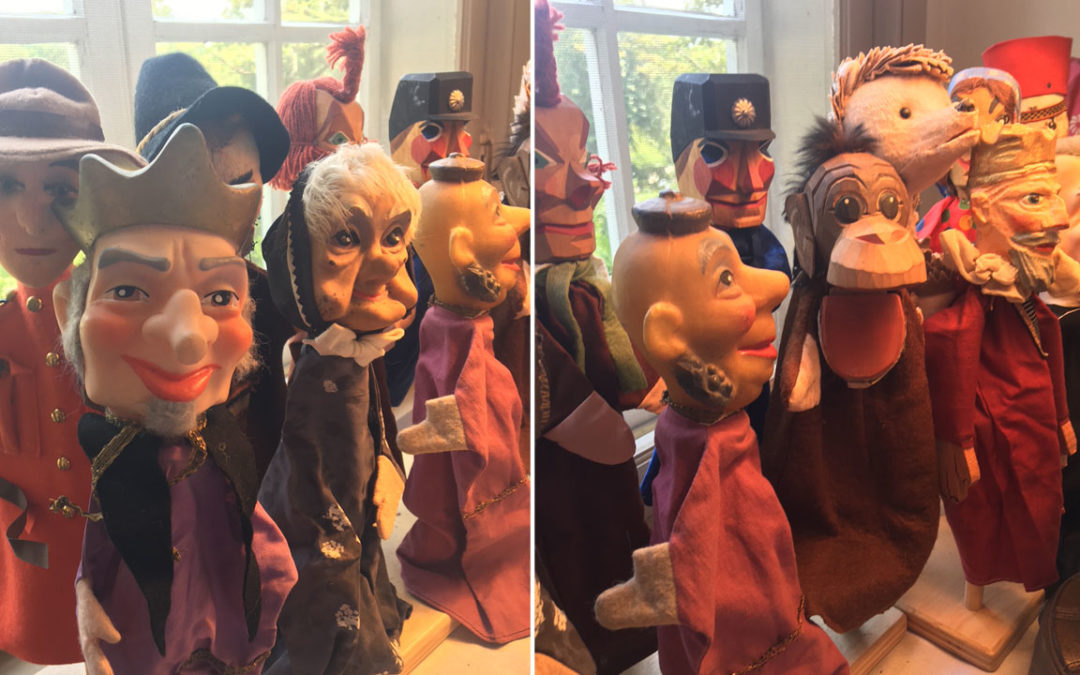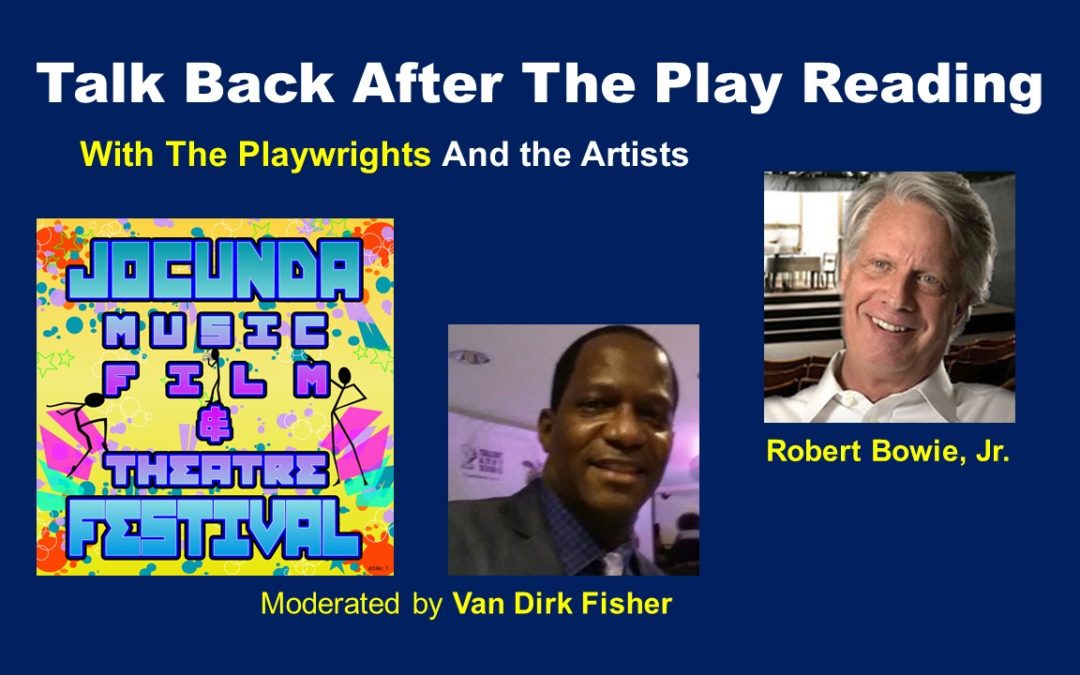
by Robert Bowie, Jr. | Aug 31, 2021 | Featured, Plays
Baltimore is a great theater town but sometimes you have to leave home to appreciate it. It offers way more access and opportunities than the theater world recognizes.
Last week, I traveled to New York and stayed at a hotel in the East Village across the street from the Village Voice. The hotel had floor-to-ceiling windows which overlooked the street. The incoming students at Cooper Union and NYU were just getting to know the city and each other as they moved through the late summer heat. The mask requirements had been reinstated for indoor spaces, but you could feel the city coming back again and, with it, a flood of joy and happy memories.
One late afternoon a few weeks before the pandemic, after a table read of The Grace of God & The Man Machine, I was drinking with the actors at The Triple Crown at 29th and 7th Avenue, a semi-dive next to The Opera Center offices where the reading had taken place.
I was bellyaching about being a geezer, starting my career as a fledgling writer so late in life. Two beautiful things happed almost simultaneously.
First, several of the actors, who, in some cases were easily half my age, somewhat seriously, told me to “shut up and grow up.” They had no pity for me, they told me unceremoniously. They were trying to make ends meet and support a family as they pursued opportunities in order to learn their craft and develop an acting career. Meanwhile, I was able to write all day and still cry in my beer. Second, they buttressed their argument by reminding me of something I had just told them moments before. I had apologetically said I have had 10 plays performed in the little theaters in Baltimore.
It was all true. I had taken it for granted. Baltimore from top to bottom is an oft-unrecognized theatre town full of opportunity. At the top, The Everyman Theater and Center Stage are nationally recognized and Everyman stands out because it has built a company which supports its actors and offers its audience the chance to get to recognize these actors.
The theaters such as Fells Point Corner, Audrey Hermann Spotlighters, The Vagabonds, Theatrical Mining Company, and others produce monthly shows at reasonable admission prices and offer competitive opportunities for actors, directors, stage designers and techs young and old. For over 25 years, they have sponsored the Baltimore Playwright’s festival, which pays burgeoning playwrights a small stipend and offers new work and summer performances.
But perhaps even more supportive are professional theater critics, such as Judy Rousuck, who have covered the Kennedy Center and the Baltimore regional theaters for years, and have also gone out of their way to cover the little theaters as well, reviewing them in The Baltimore Sun and WYPR radio, the NPR affiliate.
I had never really recognized the greatness of Baltimore theater and how much I had benefited from it until I left home and abruptly recognized the good fortune and education I had received at home.
How odd that the rebirth of New York theater would bring me back to my genesis in Baltimore. I have nothing but love and appreciation for the place and the friends and mentors I have made and found there.

by Robert Bowie, Jr. | Aug 10, 2021 | Featured, Plays
I have always been a religious man.
I have always had a deep and abiding religious belief in delusions of grandeur.
This week, COVID and the new Delta variant are again threatening to curtail the opening of New York theater, and with it, so goes again my new play, The Grace of God & The Man Machine.
It is times such as these one must fall back on faith!
It is times such as these when I feel compelled to explain the basis for my belief in delusions of grandeur and why the hell I ever decided to write for the theater.
Is there no justice? I offer you, this, my theatrical pedigree:
My first big break in theater came in fourth grade at an all-boys school when the music teacher chose a friend and I to write the big closing song for our fourth grade graduation. The thespian spirit moved me! I insisted that we end this artistic opportunity with an emotional final line, a big crescendo, in order that we fully convey our deep love of fourth grade.
I was gunning for full tears from a breathless waiting audience of emotional parents as they heard that last line rising to its explosion of emotion with the piano teacher banging out the music as all my fellow fourth graders sang:
”… and we will always love fourth grade even when we’re dead and gone!”
There was stunned silence. There were no tears. There was an explosion of laughter!
That should’ve ended my career. But no…
By eighth grade, my fragile thespian spirit had revived. I had gathered a large collection of hand puppets so I offered to put on a performance for the entire middle school.
It would be a love story!
My mother had typed out my script but I could not read it at the same time as I was putting puppets on both hands. So, I soon abandoned the script and turned to all-out stage violence. I had the entire middle school with me all the way until I lost one of the fighting puppets over the edge of the stage and my puppet stand fell into the fifth grade.
I got my first bad review from a seventh grade teacher. He looked down his nose after everyone had left and asked me: “Where did you get your inspiration for that?”
My love story had unexpectedly turned into improv but it was my obligation to tell the truth. I think I told him I was writing, as all great writers do, from what I knew. I am pretty sure I told him: “Recess.” The show closed on my opening afternoon.
That should’ve ended my career. But no…
By high school, I had given up writing for the stage but still was not able to avoid further theatrical embarrassment. The drama teacher asked me to act what he called “a small part” in The Crucible by Arthur Miller.
Apparently the first choice for the part had dropped out. I had been given the first scene in which my character, the Reverend John Hale, first enters and I was told to read it for the tryout the next day.
I was surprised but flattered when, before the reading, I learned that I had been given the part. I was shocked that evening when I took home the script and found out that my character also appeared in the second act. The more pages I turned, the more horrified I became.
Not only did I embarrass myself on stage, I even embarrassed myself in the dressing room. Back then all stage actors, particularly if they had as many lines as I did, were “tall, dark, and handsome.” As I was putting on my makeup before opening night, the director stopped in front of me and waved his hands wildly and without a moment of kindness told me: “No! No! No! You don’t need a suntan. This is winter in New England.”
That should’ve ended my career. But no…
It got worse. I just couldn’t let it go. I started writing plays for the little theaters in Baltimore. After my first play, Oriole Magic, had been cast, I shared my high school disgrace with the actors, and told them how much I admired their talent because I had developed an overriding fear of acting.
On opening night, the director came to me and told me that the leading man had dropped out of the performance and that I had to take the role. I was beyond terrified. I now would be confronted with the most horrible nightmare I could imagine… I was about to forget the lines that I had written in front of a live audience.
I fled to the bathroom fully intending to lock myself in — but once I got in there, the lead actor, who I was supposed to be replacing, could not stop laughing.
So why do I keep writing for the theater?
I think the answer is I just want to be near it. There are so many happy memories. I wrote ten plays for the wonderful little theaters in Baltimore and though many were horrible, particularly the early ones, I was forgiven my transgressions and encouraged to write again and again. It is these people I remember with great fondness and respect.
Also, when I had difficulty with school, my parents helped me get through those times. They discovered my love for telling stories before I did. My father brought back hand puppets from his travels and built me a puppet stand in the basement. My mother stitched up the puppets when they were broken and got me to lie on my bed on the third floor and dictate stories to her as she typed them out on her old typewriter.
When I improbably committed to attempting to write professionally for New York theatre, I was not shunned. I was welcomed by an amazing group of unique artists who were so talented that they could turn words and beautiful collaborative friendships into worlds in which I could live for an hour or so.
It is too late now. I know why. It is the thing itself. I love it so… and, of course I have this new idea for a wonderful play…
Back to work.

by Robert Bowie, Jr. | Jul 20, 2021 | Man Machine, Plays
After a brief vacation, I’m back and in a good mood! I am refreshed and reinvigorated after visits from the family over July 4th and thereafter, and also by great news and a fresh draft of a new play.
Or maybe I’m just happy because I’m not writing about politics?
First, the producers have told me The Grace of God & the Man Machine, which was ready to go on stage just as the pandemic hit a year and a half ago, is being reconsidered for production. Their design is to be opening off-Broadway at the beginning of next year for a 3- or 4-week promotional run. More on this later as it develops.
And second, I have a new draft for COVID comedy: The Future of the World in 70 Minutes. It is high stakes.
What makes a COVID comedy? Rebellion, revenge, and redemption?
Consider the deep lingering embarrassment rats have suffered since they dropped the ball 400 years ago when they failed to eradicate mankind with the Black Plague and thus save the planet. What could be worse?
Bats.
Bats are getting all the glory for COVID. They are smart. They have organized all of the planet’s animals and organisms to lay a new eradication trap for mankind. To trigger it, all that is needed is one revenge murder of a COVID spreader—in the name of justice. But why has the rat who has been assigned this responsibility delayed it for six months?
Could the rats fail again?
Our rat hero claims he can’t set the trap and the plan won’t work because humans are too stupid. Too stupid to fix global warming, the world’s pollution, or practice social distancing. Too stupid to wear masks and get vaccinated. So they can’t even imagine seeking justice against those who are killing their own fellow humans.
Millions dead and not even one prosecution or revenge murder? Even Man’s inhumanity to man will not work because mankind is too stupid.
Is that it? Or is our rat hero a victim of Stockholm Syndrome who secretly wants to go to Princeton, or has an eating disorder from living in a dumpster and is actually vegan?
The bats are very angry. They have just sent a general who is flying in from Wuhan. It must happen tonight…
Okay, so maybe I am still writing politics… but at least I’m happy because I had a great vacation.

by Robert Bowie, Jr. | Apr 27, 2021 | Man Machine, Personal, Plays
Yikes! Every day, in odd and different ways, I rediscover I am coming out of a dark place. So two days ago I needed someone I admired, someone inspirational, to show me some light.
So how bad was this bad place?
Two days ago, when I finished my first draft of a Covid Comedy about global warming, rats, bats and our place on the planet, I firmly believed my empathy had become misplaced by the pandemic.
The rats must be horribly embarrassed about dropping the ball 400 years ago, when their bubonic plague didn’t eradicate humankind once and for all. Because now, for the poor rats, it’s much worse.
The rats have been upstaged. These upstart bats are getting all the credit for COVID and the anti-homo sapiens dark web is reporting that the bats had unified all earth’s creatures for the great second global effort to liberate the planet. But the rats dropped the ball again because they are dangerously late coordinating and bringing out Bubonic 2.0.
Maybe it’s Stockholm Syndrome from eating human leftovers out of dumpsters for 100 years. I can feel their pain. After all, you are what you eat.
But think about how very sad the rats must feel now! Will they forever be remembered for being stupider than human beings who can’t stop global warming or polluting the planet or even stop killing their own kind and get vaccinated?
Yeah, that was dark! I decided I had better get back to creative and talented people to rediscover the joy which I had left behind.
I decided to call Van Dirk Fisher, an artist whom I admire greatly. I have never met Van in person. We have only met on Zoom calls but I have watched him work. He was the inspiration I needed.
The Black Experimental Theatre (BET) a.k.a. The Riant Theatre, was founded in New York in 1979, as a not-for-profit, tax-exempt organization, by artistic director Van Dirk Fisher. BET is a theatre that entertains as well as teaches by nurturing and developing new works by playwrights that encompass the historic and social progression of African Americans and the contributions the Black community has made in the United States. Last October, Van directed and staged a brilliant virtual performance of my play The Grace of God & The Man Machine in anticipation of a staged performance when the NYC theaters reopen.
Van is an inspiration first and foremost, both because he has and continues to make amazing art and because he overcomes the impossible, always. I saw him cast the virtual play brilliantly and then proceed to teach the actors how to use virtual backdrops, even though they were located in different states. He was so good, he got three actors in three different locations to pass a joint as if they were sitting at the same picnic table. He created both the intimacy of theater and the close-ups of movies.
The talkback afterwards had as many as 80 people participating while he artfully directed the conversation.
During the call, Van and I talked about his theatre and his accomplishments as well as about preparing for the performance of my play at The Riant Theatre.
Through the dark humor with its roots in despair came comedy, but from the dark comedy came a conversation with a Relentless Creator who brought me back to a balanced optimism with his joy.

by Robert Bowie, Jr. | Mar 23, 2021 | Personal, Plays, Poetry
We have had three successive blue sky sunny days and slightly elevated temperatures in Maryland as the COVID nightmare begins to wane and the joy of life returns.
All of a sudden with the early creativity of spring there is mischief in the air and the planet reminds me of how fortunate we all are to be here together.
As a result, I have charged back into the things I love.
Mind the Art Entertainment is producing a radio play version of The Grace of God & the Man Machine, prior to the planned stage performance at The Riant Theatre when the theaters open again in New York.
In addition, I have returned to my work on a book of 52 sonnets to be published and available on Amazon by Christmas this year. In celebration of this newfound ribald mischief, I publish here one of these poems:
The Facts of Life
I swam, back then, with some father’s daughters,
Back stroking only slightly out of touch,
Out to the raft in the starry waters
And never thought of their fathers all that much.
My child, don’t judge me till you’re fifty-five
But there were midnight visits to “Ice House Pond,”
In my misspent youth, when I was still alive,
Where couples would strip, and swim and then bond.
And my child, this I know for sure is true:
At seventeen we all are born to be free
But ’cause I’m your father and I love you
Please consider this seasoned advice from me:
As you lust for life avoid the crudity
But don’t miss occasional sponti-nudity.

by Robert Bowie, Jr. | Oct 27, 2020 | Man Machine, ONAJE Update, Plays
Last Sunday’s Zoom performance of a staged reading of The Grace of God & The Man Machine may offer an introduction to the future of theater.
The new format was advanced by a remarkably effective merger of the immediacy of live theater and the dramatic impact of the cinematic closeup.
The actors Duke Williams, Toni Seawright, C.E. Smith, Austin Sky Parker, Sheila Joon Azim, Tait Ruppert, Dexter Haag, and Peter Mendes brilliantly rose to the occasion with only four rehearsals and Van Dirk Fisher, the director of the Riant Theater, before a large and universally appreciative but invisible audience, magnificently shaped a new art form.
Judging from the chat rooms and the talk back after the performance, it was a huge success.
Maybe this is the future of theater even after the pandemic is over. Theater has always been an art form for live audiences. Cameras were reserved for the waiting room for those who were late to the performance and videos of theatrical performances always fell flat but maybe it will be different now.
Director Van Dirk Fisher and the Riant Theatre placed virtual backdrops behind the actors and the actors, all separated and in some cases in different states, reached out and past a joint between each other and exited and entered as they stepped in or out of the camera in front of which they performed alone.
The traditional narrator became a character in the performance, offering stage directions and blocking instructions as if he was organizing his remembrances of the story.
The reading took on an immediacy that a staged reading cannot provide, but the degree of difficulty remained almost unnoticed for an audience which tuned in from New York to California.
The infectious immediacy of theater and the dramatic impact of the cinematic closeup? Why not? Live sports events come to life for the fans in attendance and at the same time offer the close up for those viewing the game at home.
Van, always the scholar, always the innovator, always pushing ahead, told me that Zoom is perfecting moving backgrounds, such as a view of the highway from the car in motion. Imagine theater sets that move to support the live action of the performances on stage.
This could be coming as the innovation created by these remarkable creative artists.






